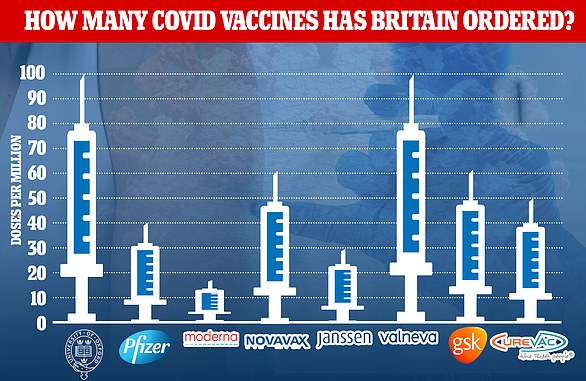The South African variant of coronavirus, known as B.1.351, has mutations on its outer spike proteins that change the shape of the virus in a way that makes it look different to the body than older versions of the virus.
Because the immune system’s antibodies are so specific, any change in the part of the virus that they attach to – in this case the spikes – can affect how well they can do so.
Current vaccines have been developed using versions of the virus from a year ago, which didn’t have the mutations the South African variant does, so scientists are worried the immunity they create won’t be good enough to stop it.
Here’s what we know about the vaccines and the variant so far:
Oxford/AstraZeneca (Approved; Being used in the UK)
Research published in February claimed that the Oxford/AstraZeneca vaccine appears to have a ‘minimal effect’ against the South African variant.
A study of 2,000 people by the University of Witwatersrand in Johannesburg found that two doses of the jab may only offer 10-20 per cent protection against mild or moderate Covid-19.
The study was controversial, however – nobody in the test group developed severe Covid-19 but the researchers said this ‘could not be assessed in this study as the target population were at such low risk’. Participants’ average age was 31 and they were otherwise healthy.
Scientists working on the vaccine said they still believe it will be protective.
Oxford and AstraZeneca said they are already working on a booster jab targeted at the South African variant and that it will be ready by autumn.
Pfizer/BioNTech (Approved; Being used in the UK)
Two studies suggest that Pfizer and BioNTech’s vaccine will protect against the South African variant, although its ability to neutralise the virus is lower.
One by Pfizer itself and the University of Texas found that the mutations had ‘small effects’ on its efficacy. In a lab study on the blood of 20 vaccine recipients they found a reduction in the numbers of working antibodies to tackle the variant, but it was still enough to destroy the virus, they said.
Another study by New York University has made the same finding on 10 blood samples from people who had the jab. That team said there was a ‘partial resistance’ from the variant and that a booster should be made, but that it would still be more effective than past infection with another variant.
Pfizer is developing an updated version of its jab to tackle the variant.
Moderna (Approved; Delivery expected in March)
Moderna said its vaccine ‘retains neutralizing activity’ in the face of the South African variant.
In a release in January the company said it had tested the jab on the blood of eight people who had received it and found that antibody levels were significantly lower when it was exposed to the South Africa variant, but it still worked.
It said: ‘A six-fold reduction in neutralizing [antibodies] was observed with the B.1.351 variant relative to prior variants. Despite this reduction, neutralizing levels with B.1.351 remain above levels that are expected to be protective.’
Moderna is working on a booster jab to tackle the South African variant.
Janssen/Johnson & Johnson (Awaiting approval; 30m doses)
Janssen, a subsidiary of Johnson & Johnson, has trialled its vaccine in South Africa and found it prevented 57 per cent of Covid cases.
This was the lowest efficacy the company saw in its global trials – in Latin America it was 66 per cent and in the US 72 per cent. These differences are likely in part due to the variants in circulation.
The vaccine was 85 per cent effective at stopping severe disease and 100 per cent effective at stopping death from Covid-19, even in South Africa where the variant is dominant, Janssen said.
